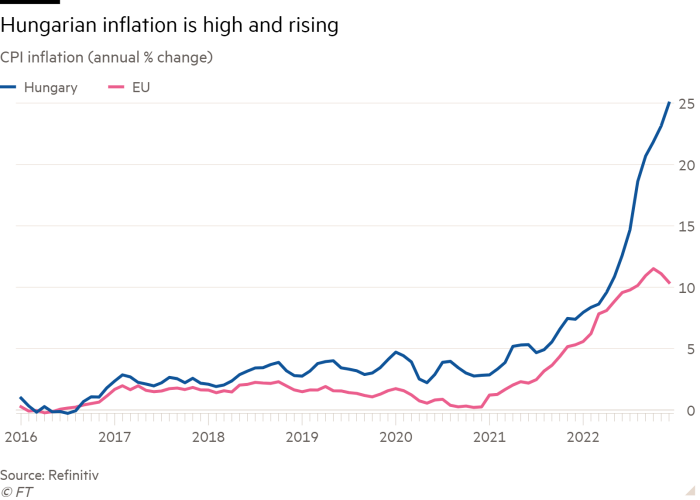[the_ad id="21475"]
[ad_1]
With long queues at petrol pumps, teachers blocking Budapest streets in a strike over pay and small-business owners demonstrating against tax rises, Hungary’s economic woes and the resulting public anger have wrongfooted rightwing prime minister Viktor Orbán and threaten to escalate his dispute with Brussels over frozen funding.
“I take second jobs and give private classes,” said Budapest teacher Bence Tóth, who joined his profession’s year-long rolling strikes after struggling amid soaring inflation. “I work or commute or sleep. It’s unsustainable.”
Despite measures such as retail price caps introduced even before the war in Ukraine sparked an energy crisis, food and power prices in Hungary rose about 50 per cent in December compared with the previous year, according to government data. Overall inflation rose 24.5 per cent year on year on December, the highest in the EU. The bloc’s average is 10.4 per cent.
Economists pin the blame partly on a weak forint, the phaseout of price caps and a retail tax. The price caps themselves had a distorting effect, they say, causing shortages of fuel and staples such as sugar as importers and retailers declined to sell below cost, as well as leading to price rises for non-capped products as they sought to compensate for the cap on other goods. The government was last month forced to remove the fuel cap after supplies collapsed, sparking panic buying.
Lajos Török, chief analyst at Budapest brokerage Equilor, warned the picture would worsen. “Household expenses rise so domestic consumption will fall, higher financing costs will delay corporate investments, state investments will be cut back” all but erasing growth, he said.
The economic troubles will limit Orbán’s scope to pacify the public with costly populist measures, a tool he has deployed in the past, just as his Fidesz party prepares for municipal and European elections in 2024.
“Hungary’s inflation is bad news all around,” said Dániel Hegedűs of the German Marshall Fund, a US-based think-tank. The prime minister would be forced to abolish the price caps, he said, which would itself add to cost pressures for his electoral base. “This will massively impact a much wider and lower social class, which can hurt Orbán,” he added.
Public discontent is mounting. Teachers, who are seeking a wage rise of around 45 per cent and are also protesting over high workloads and central control of the education system, began another week-long…
Click Here to Read the Full Original Article at UK homepage…
[ad_2]
[the_ad id="21476"]
